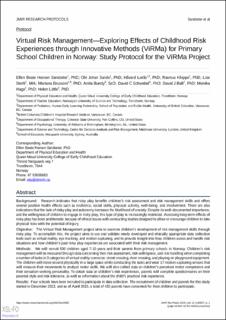Virtual Risk Management—Exploring Effects of Childhood Risk Experiences through Innovative Methods (ViRMa) for Primary School Children in Norway: Study Protocol for the ViRMa Project
Sandseter, Ellen Beate Hansen; Sando, Ole Johan; Lorås, Håvard Wuttudal; Kleppe, Rasmus; Storli, Lise; Brussoni, Mariana; Bundy, Anita; Schwebel, David C; Ball, David; Haga, Monika; Little, Helen
Peer reviewed, Journal article
Published version

Åpne
Permanent lenke
https://hdl.handle.net/11250/3084259Utgivelsesdato
2023Metadata
Vis full innførselSamlinger
- Institutt for lærerutdanning [3692]
- Publikasjoner fra CRIStin - NTNU [38127]
Sammendrag
Research indicates that risky play benefits children’s risk assessment and risk management skills and offers several positive health effects such as resilience, social skills, physical activity, well-being, and involvement. There are also indications that the lack of risky play and autonomy increases the likelihood of anxiety. Despite its well-documented importance, and the willingness of children to engage in risky play, this type of play is increasingly restricted. Assessing long-term effects of risky play has been problematic because of ethical issues with conducting studies designed to allow or encourage children to take physical risks with the potential of injury.
